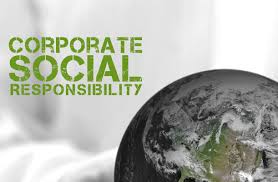 By beCause Associate Ravi Chaudhry — Business has been the most powerful institution on the planet since the second half of the twentieth century. Dr Willis Harman, co-founder of the World Business Academy in 1987 put forward the view that the dominant institution in any society needs to take responsibility for the whole, as the church did in the days of the Holy Roman Empire.
By beCause Associate Ravi Chaudhry — Business has been the most powerful institution on the planet since the second half of the twentieth century. Dr Willis Harman, co-founder of the World Business Academy in 1987 put forward the view that the dominant institution in any society needs to take responsibility for the whole, as the church did in the days of the Holy Roman Empire.
Built into the original concept of capitalism and free enterprise was the assumption that the actions of many individual enterprises, responding to the market forces and guided by the ‘invisible hand’ of Adam Smith, would somehow add up to desirable outcomes. But it is amply clear that the ‘invisible hand’ is faltering. It depended on a consensus of overarching meanings and values that are no longer present. So business has to adopt a tradition it has never had throughout the history of capitalism: to share the responsibility for the whole. Every decision made and every action taken, must be viewed in the light of that kind of responsibility. This is a new role, not yet understood or accepted.
Milton Friedman, the recipient of 1976 Nobel Prize in Economics was a key proponent of free market economics. Inadvertently, he became the unofficial custodian of social unconsciousness in business. In 1970, he wrote an article titled: The Social Responsibility of Business is to Increase its Profits, in which he expounded: “What does it mean to say that ‘business’ has responsibilities? Only people can have responsibilities. A corporation is an artificial person and in this sense may have artificial responsibilities, but ‘business’ as a whole cannot have any responsibilities. If you own a business, you can do what you like. But if you are managing a business, in which there are other shareholders, you can have no other objective but to focus entirely on increasing the profits of the enterprise. You are a corporate executive, and not a civil servant, with a mandate for anything resembling alleged social responsibilities.”
This led to a widespread perception that business objectives and society’s needs tend to be like the two tracks of a railway line. Looking ahead from any point, they appear to converge in the distance; in reality they never do. It is a mirage.
The 1998 publication of John Elkington’s Cannibals with Forks: The Triple Bottom Line of 21st Century Business, launched the notion of ‘Triple Bottom Line’ of People, Planet and Profit. In a way, it filled a void and prima facie, it appeared to awaken corporations from their slumber and alerted them to the need for proactive social accountability. But even two decades later, the corporate character has barely changed, and the Corporate Social Responsibility (CSR) activities continue to be a mere side show for scoring brownie points, while business goes on as usual.
Subsequent initiatives such as United Nations Global Compact, Global Reporting Initiative, and many others also did not yield the expected dividends. The truthfulness or utility of the corporate reporting can be gauged by one simple observation: whereas all companies have upward and downward movements in their financial bottom line, including losses in certain years, the two bottom lines on social responsibility and environmental issues are always in positive territory, with great improvements every year.
When nothing can be quantifiably verified, how can anyone expect corporations to say that they are less socially responsible this year than in the previous year? Nonetheless, the avalanche of efforts certainly helped remind the corporate sector that they do have some responsibilities beyond the corporate ones. At least in some cases, CSR acquired a useful connotation that CSR should focus not on what a company does with the profits it makes, it should also focus on how the company makes its profits.
Meanwhile, vast majorities in most countries are deeply anguished with corporate indifference to how their actions impact the society. It is increasingly realized that the future growth and progress of corporations will be directly linked with the growth and progress of communities and societies in which they function. Corporate CEOs can no longer brush it away as mere philanthropic talk. The only choice is: ‘accept it grudgingly or willingly’. The new mind-set required to cope with this reality will become the new dividing line between corporations that succeed in the short-term and fail soon after and others who succeed with new paradigms and prevail thereafter.
A survey of managers who attended Harvard Business School’s CSR executive education programs during 2010-2014, revealed that the widely accepted ideal of pursuing “shared value” – creating economic value in ways that also create value for society – is not the norm. CSR programs are often initiated and run in an uncoordinated way by a variety of internal managers, frequently without the active engagement of the CEO.
Soon thereafter, I wrote that the paradigm change will come about by taking the step forward from ‘Corporate Social Responsibility‘ to ‘Individual Social Responsibility’ of the CEO: from CSR to ISR; from generic corporate accountability to specific individual answerability of the CEO for the corporation’s actions. From merely a symbolic, committee-led, audit-based system to a system prompted and propelled by CEO’s conscience.[1]
I made the case that I sense the crack of a new dawn — the evolution of a new phase of human enterprise that is redefining the criteria of success as well as re-contouring the routes to success. Even the skills required to stay successful are undergoing re-configuration.
Today, I foresee new welcome signs – a transition to the phase beyond CSR, the emergence of a Socially Responsible Corporation (SRC), a corporation genuinely committed to ensure that all its activities are in sync with societal expectations and preservation of nature.
A Socially Responsible Corporation is evolving and imbibing a new corporate DNA, anchored on the firm conviction that “a company with focus on making only money will hereafter be considered a poor company”.
You cannot have a Socially Responsible Corporation partially. Either it is an SRC, or it is not. If it is or if it aspires to be one, the CEO of SRC has to meet the following three criteria in entirety.
- She firmly believes that responsible leadership is not just being held responsible for what we do, but also for what we do not do.
- She ensures that all the decisions she makes and all the actions she takes have a positive, sustainable impact on the lives and livelihoods of not only all the stakeholders in her enterprise, but also on society.
- She works with crystal clear transparency – transparency not merely of her actions but also of her thoughts, transparency not just in chosen domains, but complete, total transparency.
In practice, the sense of responsibility of an SRC leader reflects in her ‘ability to respond responsibly’, with sensitivity, understanding, and urgency, and leads to an implicit acceptance of personal accountability for everything the company does or does not.
A CEO’s key task today is to proactively initiate this tangible transformation in the corporate character, a transition from generic Corporate Social Responsibility (CSR) to becoming a holistic Socially Responsible Corporation (SRC). This inevitably will be the true emblem of a Great Company in the next decade.
Many family-owned businesses worldwide are already in the forefront of leading this transformation. It is my earnest hope that they can become the harbingers of what will be a new epoch in corporate governance.
———-
Ravi Chaudhry, is Chairman CeNext Consulting Group and Author, Quest for Exceptional Leadership: Mirage to Reality, www.ravichaudhry.com
[1] Excerpted from Author’s book: Quest for Exceptional Leadership: Mirage to Reality 2nd Edition (SAGE, 2016)

